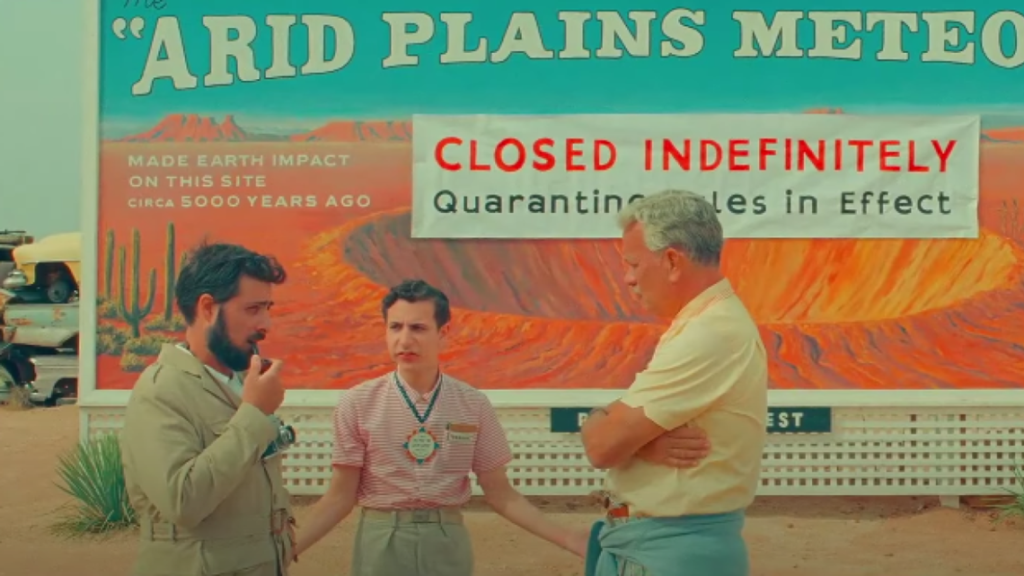Wes Anderson’s 11th feature film captivates audiences with its whimsical charm and unique take on science fiction
In “Asteroid City,” renowned filmmaker Wes Anderson showcases his exceptional talent once again, this time venturing into the realm of science fiction. True to his distinctive style, Anderson masterfully combines elements of the genre with his signature practices, resulting in a pastel-soaked cinematic experience that delights viewers.
Enchanting Meta-Storytelling and Visual Splendor
Anderson’s narrative approach in “Asteroid City” involves the use of a teleplay-style narrator, portrayed by Bryan Cranston, to provide expository details about a stage play titled “Asteroid City.” The film’s visuals, beautifully captured by cinematographer Robert Yeoman on Kodak film, exude a saturated softness that enhances the film’s dreamlike quality.

A Vibrant Expedition in a Quirky Town
Set in a small 1950s southwestern town known for its main tourist attraction—a small meteor surrounded by a comically large crater— “Asteroid City” centers around the Junior Stargazer/Space Cadet convention. This event brings together an eclectic mix of characters, including parents, children, and scientists, for scholarly competitions and communal activities. However, when a lovable alien unexpectedly appears, the town’s residents and temporary visitors find themselves in quarantine under the U.S. military’s watchful eye.
A Stellar Ensemble Cast and Anderson’s Trademark Quirkiness
As expected from Anderson’s creative endeavors, “Asteroid City” features an ensemble cast comprising both returning collaborators and fresh faces. Tilda Swinton, Adrien Brody, Edward Norton, Tony Revolori, Willem Dafoe, Jeff Goldblum, Liev Schreiber, Rupert Friend, Jeffrey Wright, and Stephen Park bring their unique talents to the kaleidoscope of quirky characters that inhabit the film. Additionally, newcomers Maya Hawke, Hope Davis, Matt Dillon, and Hong Chau make their mark in Anderson’s cinematic universe.
Balancing Safety with Emotional Validity
While the overarching story of “Asteroid City” may appear relatively safe and straightforward, Anderson subtly explores deeper themes. The meta-play interludes, characterized by a change in aspect ratio and a shift from saturated pastels to stark black-and-white, explore the duality of dreams and reality. Through Augie’s introspective moments and the actor persona portrayed by Jason Schwartzman, Anderson questions the necessity of explicit justification in art and the significance of creative indulgence.
A Mind-Expanding Experience and Endlessly Thought-Provoking
Anderson’s foray into science fiction unveils his boundless creativity and leaves audiences yearning for more surprises from the celebrated filmmaker. “Asteroid City” offers an open-ended narrative that invites viewers to interpret its connotations. With subtle undertones of grief, the human condition, and the pursuit of the incomprehensible, the film leaves a lasting impression and sparks a whirlwind of contemplation. Unfailingly enchanting from start to finish, “Asteroid City” is a cinematic gem that evokes smiles and showcases Anderson’s profound filmmaking prowess.
